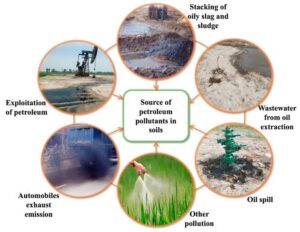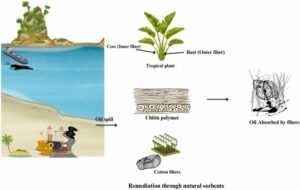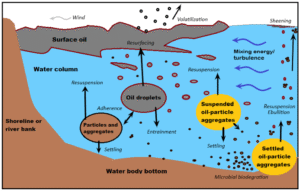Back to: Environmental Biology 200 Level
Welcome to class!
Hello bright star! Have you heard of the oil spills in the Niger Delta that leave rivers black and farmland useless? Oil spills are serious environmental disasters that harm people, animals, and plants. Today, we’ll talk about Oil Spill Ecology and Remediation, understanding how oil spills affect our environment and what can be done to fix the damage.
Oil Spill Ecology And Remediation
What is an Oil Spill?
An oil spill occurs when crude oil or petroleum products leak into the environment, especially into rivers, seas, or land. This can happen during drilling, transportation, or accidents like pipeline bursts.

Causes of Oil Spills
Pipeline Leaks and Bursts: Old or damaged oil pipelines leaking into the environment.
Tanker Accidents: Ships carrying oil spilling into oceans and rivers.
Illegal Bunkering: Sabotage and oil theft leading to spills.
Poor Maintenance: Weak safety measures by oil companies.
Natural Causes: Rare events like natural disasters can also cause spills.
Effects of Oil Spills on the Environment
Water Pollution: Oil forms a layer on water surfaces, making it hard for aquatic animals to survive.
Soil Damage: Spilled oil reduces soil fertility, affecting farming.

Harm to Wildlife: Birds, fish, and other animals can die when covered with oil.
Human Health: Communities relying on polluted rivers for drinking water suffer from diseases.
Economic Losses: Fishermen and farmers lose their livelihoods due to polluted water and land.
Oil Spill Ecology
Oil spills affect the balance of ecosystems. In aquatic systems, oil blocks sunlight, reducing photosynthesis in plants and algae. In soil, toxic substances from oil seep deep into the ground, killing microorganisms and making it hard for plants to grow.
Remediation (Cleaning Up Oil Spills)
Physical Methods: Using booms, skimmers, and absorbent materials to collect oil from water surfaces.
Chemical Dispersants: Chemicals that break down oil into smaller particles that mix with water.
Bioremediation: Using microorganisms to naturally break down oil in soil and water.
Soil Replacement: Removing contaminated soil and replacing it with clean soil for farming.
Reforestation: Planting trees and vegetation to restore damaged lands.
Preventing Oil Spills
Regular maintenance of pipelines and oil facilities.

Proper monitoring and quick response to leaks.
Using modern technology to detect and prevent spills.
Enforcing strict laws against oil theft and sabotage.
Summary
- Oil spills happen when oil leaks into the environment, mainly water and land.
- Causes include pipeline leaks, accidents, and illegal activities.
- Oil spills harm water, soil, wildlife, and human health.
- Remediation methods include physical cleaning, chemical dispersants, and bioremediation.
Evaluation
- What is an oil spill?
- Mention two effects of oil spills on the environment.
- What is bioremediation?
- State two ways to prevent oil spills.
You’re doing an amazing job! Understanding oil spills and their solutions makes you part of the next generation of problem-solvers who will protect Nigeria’s environment. Keep learning with Afrilearn — the future is in your hands.
